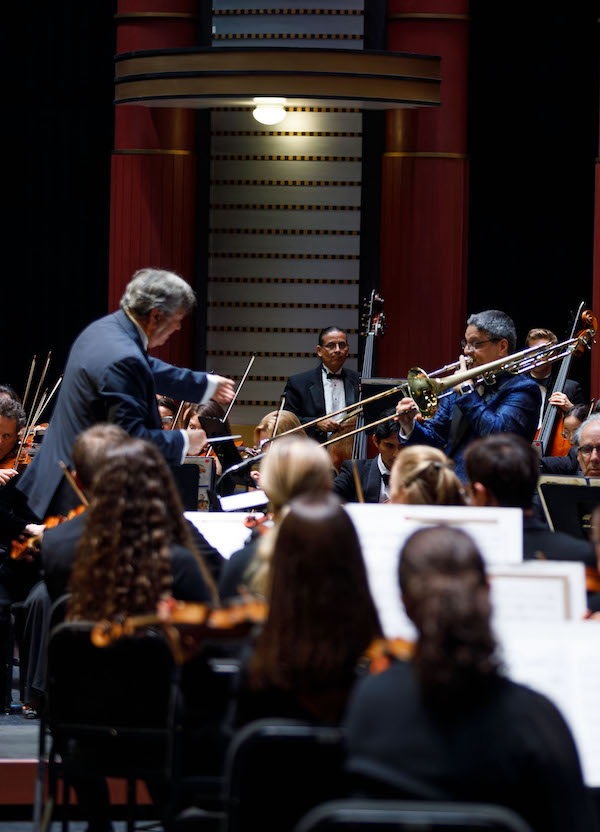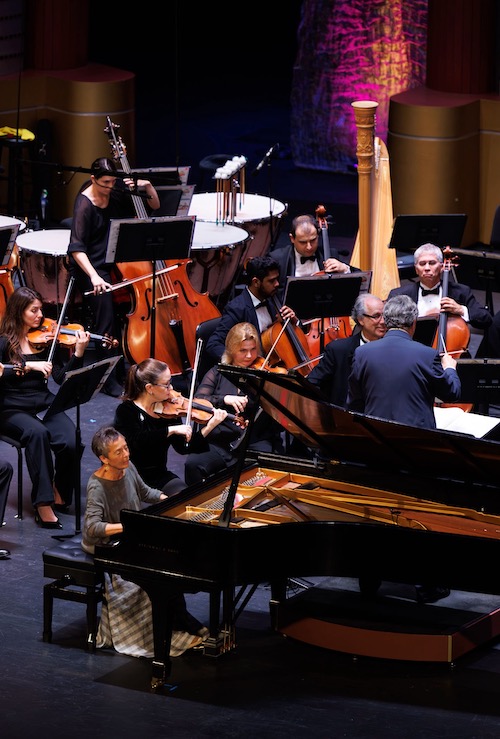Palm Beach Symphony features two soloists, provides timely Franck excavation in season finale

Domingo Pagliuca was the trombone soloist in Adolphus Hailstork’s “Monuments” with Gerard Schwarz and the Palm Beach Symphony Monday night at the Kravis Center. Photo: IndieHouse Films
For much of the 20th century, César Franck’s Symphony in D Minor contended for popularity with the symphonies of Beethoven and Tchaikovsky.
But in the 1970s, the work started to fade from concert programs, a decline explored in the New York Times last year in an article headlined “What Happened to One of Classical Music’s Most Popular Pieces?” The author, David Allen, didn’t come up with a firm answer, although he suggested the cause may have been the 1888 work’s lack of obvious complexity or its absence of influence on later composers.
The Palm Beach Symphony dusted off this classic for the final concert of its 49th season Monday at the Kravis Center in West Palm Beach, giving a vigorous, tension-filled and exciting performance of a work that deserves to be performed more frequently.
Conductor Gerard Schwarz took an unhurried approach to the slow opening section, drawing maximum suspense from Franck’s restless harmonies. Strings and winds produced glowing tones, with the languorous approach paying off with a crescendo to a jubilant outburst of brass. The faster section that followed crackled with energy, with Schwarz allowing the orchestra to open up to full power at climactic moments.
The Allegretto, with its harp and plucked strings, was a solemn processional, lightened by the glow of the orchestra’s woodwinds. Although a work of overheated Romanticism like the Franck symphony may not be the occasion for subtlety, textures in the Finale were particularly clear and transparent, as different sections of the orchestra pierced the wash of sound with fragments of one of the main melodies. With shining brass playing that never overpowered the other sections, the movement came off as a joyful consummation of the energies built up over the course of the symphony.
The orchestra’s principal trombone, Domingo Pagliuca, took the stage as soloist in American composer Adolphus Hailstork’s Monuments for trombone and string orchestra. Not quite a concerto despite its cadenza, the work traverses considerable ground in just over ten minutes of music.
Brooding strings with touches of dissonance set the stage for the emergence of the trombone in somber tones. In Pagliuca’s hands, the instrument showed great versatility—breaking through the orchestra with assertive low tones that communicated sheer power, playing a fast-paced melody over tense string figures and playing wistful, singing melodies in rich, full tones. Effectively orchestrated, Monuments uses the contrast between the crisp, biting tones of the strings and the dark, rounded trombone sound for an effective and engaging showpiece for the instrument.

Maria João Pires performed Mozart’s Piano Concerto No. 23 with the Palm Beach Symphony Monday night. Photo: IndieHouse Films
The Portuguese pianist Maria João Pires made an extended stay in South Florida over the past week, giving master classes at the University of Miami’s Frost School of Music and performing a well-received recital of Schubert, Debussy and Beethoven Saturday at the university’s Gusman Hall.
Appearing Monday with the Palm Beach Symphony, Pires performed Mozart’s Piano Concerto No. 23 in A Major. Aided by the vivacious playing of the orchestra, she gave a performance that expressed the concerto’s joy and sorrow, with playing that was effortless and clear, but never dry. Her performance was deceptively straightforward, getting to the heart of the work by playing in a manner that was neither scholarly nor excessively free.
She brought a sense of the long line to the rapid passages that abound in the first movement, playing runs and other quick passages with a sense of their melodic meaning, while maintaining energy. In lesser hands, such passages can come off as etude-like parades of notes.
In the grave Adagio, one of Mozart’s darker creations, her hushed playing expressed the movement’s pathos, with a fine level of gradations between piano and pianissimo. Particularly striking were the sonorous passages in which her playing intertwined with the woodwinds. Her sure touch and spirited playing brought out the last movement’s high spirits.
Gerard Schwarz opens the Palm Beach Symphony’s 50th anniversary season November 19 with Yefim Bronfman performing Brahms’ Piano Concerto No. 2. The program also includes Richard Strauss’s Suite from Der Rosenkavalier and the world premiere of Bright Sheng’s Black Swan. palmbeachsymphony.org
Posted in Performances
Leave a Comment
Tue May 16, 2023
at 11:39 am
No Comments